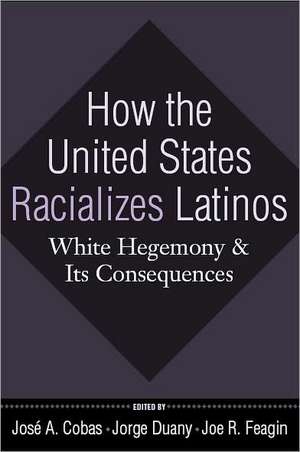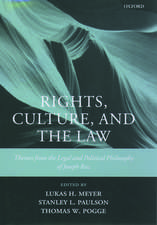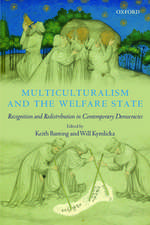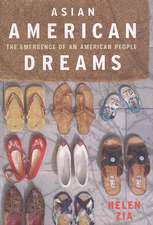How the United States Racializes Latinos: White Hegemony and Its Consequences
Autor José A. Cobas, Jorge Duany, Joe R. Feaginen Limba Engleză Paperback – 30 sep 2009
| Toate formatele și edițiile | Preț | Express |
|---|---|---|
| Paperback (1) | 258.14 lei 43-57 zile | |
| Taylor & Francis – 30 sep 2009 | 258.14 lei 43-57 zile | |
| Hardback (1) | 1181.73 lei 43-57 zile | |
| Taylor & Francis – 30 mai 2009 | 1181.73 lei 43-57 zile |
Preț: 258.14 lei
Preț vechi: 310.45 lei
-17% Nou
Puncte Express: 387
Preț estimativ în valută:
49.39€ • 51.71$ • 40.87£
49.39€ • 51.71$ • 40.87£
Carte tipărită la comandă
Livrare economică 07-21 aprilie
Preluare comenzi: 021 569.72.76
Specificații
ISBN-13: 9781594515996
ISBN-10: 1594515999
Pagini: 264
Dimensiuni: 152 x 229 x 15 mm
Greutate: 0.36 kg
Ediția:1
Editura: Taylor & Francis
Colecția Routledge
Locul publicării:Oxford, United Kingdom
ISBN-10: 1594515999
Pagini: 264
Dimensiuni: 152 x 229 x 15 mm
Greutate: 0.36 kg
Ediția:1
Editura: Taylor & Francis
Colecția Routledge
Locul publicării:Oxford, United Kingdom
Recenzii
“Latinos now constitute the largest racially defined ‘minority’ group in the United States. Not only has their racial identity been fiercely debated, but also the Latinization of U.S. culture and politics remains a contentious issue. This book systematically explores these questions, examining both the past and present dynamics of the Latino/a experience in the United States. Looking at census politics, panethnicity, violence and lynching, immigration and urbanization, education, language politics, and indeed the meaning of race itself, Cobas, Duany, and Feagin's volume is an indispensable resource for scholars, teachers, and students seeking to make sense of contemporary U.S. racial conditions. Highly recommended for course adoption!”
—Howard Winant, University of California, Santa Barbara
“The wait is over. We finally have a comprehensive book on the racialization of Latinos in the USA that is theoretically sophisticated, historically rich, and that deals with the multiple realities they face. ... A very important contribution!”
—Eduardo Bonilla-Silva, Duke University
“How the United States Racializes Latinos should leave no doubt that many Latinos have been and continue to be subject to the pernicious effects of racialization. Cobas, Duany, and Feagin’s splendid collection of articles by noted scholars provides valuable lessons for how the United States will or should integrate today’s large influx of Latino immigrants and their descendants. It will become essential reading for those interested in how the American prism of race is used to categorize, treat, and stratify this nationally, culturally and phenotypically diverse group.”
—Edward E. Telles, Princeton University
"For scholars in Latino/a Studies who are working on the historical and social construction of racializations and race, this collection is indispensible."
—Ronald L. Mize in Latino Studies
"...a compelling narrative for understanding the processes by which immigrant groups, particularly those from Latin America and the Caribbean, become stigmatized in the contemporary era of vigilant nativism. The book is a collection of intriguing and timely analyses..."
—Luis F. Nuno, William Paterson University
—Howard Winant, University of California, Santa Barbara
“The wait is over. We finally have a comprehensive book on the racialization of Latinos in the USA that is theoretically sophisticated, historically rich, and that deals with the multiple realities they face. ... A very important contribution!”
—Eduardo Bonilla-Silva, Duke University
“How the United States Racializes Latinos should leave no doubt that many Latinos have been and continue to be subject to the pernicious effects of racialization. Cobas, Duany, and Feagin’s splendid collection of articles by noted scholars provides valuable lessons for how the United States will or should integrate today’s large influx of Latino immigrants and their descendants. It will become essential reading for those interested in how the American prism of race is used to categorize, treat, and stratify this nationally, culturally and phenotypically diverse group.”
—Edward E. Telles, Princeton University
"For scholars in Latino/a Studies who are working on the historical and social construction of racializations and race, this collection is indispensible."
—Ronald L. Mize in Latino Studies
"...a compelling narrative for understanding the processes by which immigrant groups, particularly those from Latin America and the Caribbean, become stigmatized in the contemporary era of vigilant nativism. The book is a collection of intriguing and timely analyses..."
—Luis F. Nuno, William Paterson University
Cuprins
Introduction, José A. Cobas, Jorge Duany, Joe R. Feagin; Chapter 1 Pigments of Our Imagination, Rubén G. Rumbaut; Chapter 2 Counting Latinos in the U.S. Census, Clara E. Rodríguez; Chapter 3 Becoming Dark, Fernando Purcell; Chapter 4 Repression and Resistance, William D. Carrigan, Clive Webb; Chapter 5 Opposite One-Drop Rules, Laura E. Gómez; Chapter 6 Racializing the Language Practices of U.S. Latinos, Ofelia García; Chapter 7 English-Language Spanish in the United States as a Site of Symbolic Violence, Jane H. Hill; Chapter 8 Racialization Among Cubans and Cuban Americans, Lisandro Pérez; Chapter 9 Racializing Miami, Elizabeth Aranda, Rosa E. Chang, Elena Sabogal; Chapter 10 Blacks, Latinos, and the Immigration Debate, Xóchitl Bada, Gilberto Cárdenas; Chapter 11 Central American Immigrants and Racialization in a Post–Civil Rights Era, Nestor P. Rodriguez, Cecilia Menjívar; Chapter 12 Agency and Structure in Panethnic Identity Formation, Zulema Valdez; Chapter 13 Racializing Ethnicity in the Spanish-Speaking Caribbean, Jorge Duany; Chapter 14 Transnational Racializations, Wendy D. Roth;
Notă biografică
José A. Cobas, Jorge Duany, Joe R. Feagin
Descriere
Mexican and Central American undocumented immigrants, as well as U















